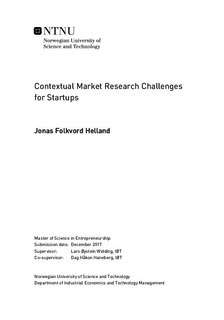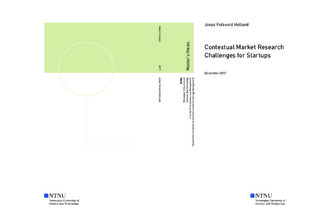| dc.description.abstract | Even though the field of market research (MR) has evolved in sophistication, scope and importance over the years, previous research has mostly focused on large, resource-abundant corporate organizations and has ignored startups. Consequently, startups are assessed in the context of existing models based on large firm practices, something that fails to consider the resource constraints and capability limits of small, entrepreneurial firms. Current research within the field of entrepreneurship has identified that the applicability of current MR theories to a startups decision making is limited, and that the MR literature fails to relate to the unique context of the entrepreneur. This contextual gap in the MR field is unfortunate, as the greatest risk for startups in order to survive and grow lies not in the development of new products, but in the development of customers and markets.
This study starts by reviewing MR literature, in order to define the contextual MR challenges for startups and define propositions for how to deal with these challenges. Based on an abductive approach of combining theoretical findings and empirical data, the author presents a detailed, actionable and coherent framework for startups to use when conducting MR. This framework addresses specific challenges that startups are likely to encounter when conducting MR, and suggests appropriate strategies for handling these challenges.
The identified challenges in the framework are related to both the research design, data collection and sampling stage of the design phase and of the execution phase of the MR process. Here, the use of simple, inexpensive methods, small sample sizes and the need to use non-probability sampling are identified as the main MR challenges for startups in the design phase. Subsequently, asking the right questions, the lack of continuous work and how everything takes longer are critical challenges that needs to be handled in the execution phase. To deal with these challenges, the author presents the following four strategies for a startup context: Be pragmatic in research design, combine methods, harness online resources and harness relationships.
The initial framework is illustrated through a single-case longitudinal study, which explores the nuances and details of a startup conducting MR, and describes MR challenges and strategies in-depth. The selected case is the MR conducted by the American startup One Earth Designs between November 2016 and March 2017. The goal of this MR was to inform the marketing and product development of a new, incremental product innovation for the American outdoor market, namely a portable solar cooker. Due to the author s role as Marketing Officer in the startup throughout the study, data was collected through participant-observation, interviews and documentation. Throughout the analysis, the author identifies how the approach used by One Earth Designs is distinctly different to the large-firm processes described in the MR literature, even though the methods and techniques in themselves are similar. The case study is presented through a comprehensive and detailed analysis.
The author contributes to theory by suggesting a new pragmatic approach to MR for startups, in which combining methods, being systematic and making choices are key principles. This pragmatic approach provides an important step in filling the contextual gap identified in the MR literature, by recognizing the unique context in which startups that are developing new incremental product conduct their MR. Furthermore, by identifying appropriate strategies for handling the lack of statistical power and resource constraints, the suggested approach will help increase the relevancy and applicability of current MR literature to startups.
Further research should focus on four topics identified in this study. First, the distinction between challenges arising for startups in quantitative and qualitative research needs to be clarified. Secondly, the impact of startups non-MR-related daily responsibilities on the MR work needs to be investigated. Thirdly, to what extent MR experience or expertise is present in startups and how this impacts the ability to ask the right questions in MR needs more research. Fourthly, further research should consider how online resources best can be harnessed by startups as a key srategy in obtaining high-quality MR data. In addition, more quantitative research is needed to test both the elements present in the theoretical framework, and the relationships between these elements. Finally, substantial work is needed to develop the pragmatic approach to MR, which makes MR more applicable and less resource intensive for startups. | |

